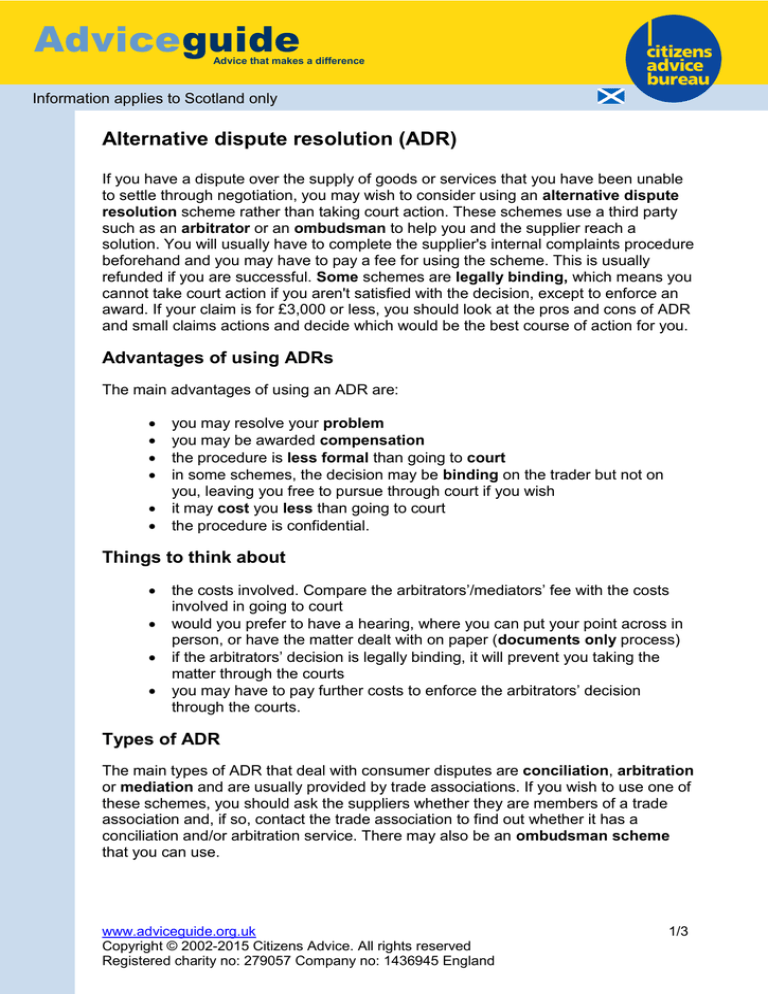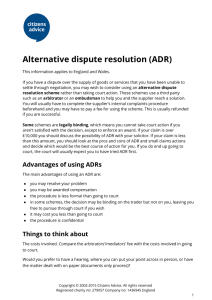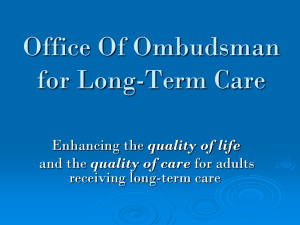
Adviceguide
Advice that makes a difference
Information applies to Scotland only
Alternative dispute resolution (ADR)
If you have a dispute over the supply of goods or services that you have been unable
to settle through negotiation, you may wish to consider using an alternative dispute
resolution scheme rather than taking court action. These schemes use a third party
such as an arbitrator or an ombudsman to help you and the supplier reach a
solution. You will usually have to complete the supplier's internal complaints procedure
beforehand and you may have to pay a fee for using the scheme. This is usually
refunded if you are successful. Some schemes are legally binding, which means you
cannot take court action if you aren't satisfied with the decision, except to enforce an
award. If your claim is for £3,000 or less, you should look at the pros and cons of ADR
and small claims actions and decide which would be the best course of action for you.
Advantages of using ADRs
The main advantages of using an ADR are:
you may resolve your problem
you may be awarded compensation
the procedure is less formal than going to court
in some schemes, the decision may be binding on the trader but not on
you, leaving you free to pursue through court if you wish
it may cost you less than going to court
the procedure is confidential.
Things to think about
the costs involved. Compare the arbitrators’/mediators’ fee with the costs
involved in going to court
would you prefer to have a hearing, where you can put your point across in
person, or have the matter dealt with on paper (documents only process)
if the arbitrators’ decision is legally binding, it will prevent you taking the
matter through the courts
you may have to pay further costs to enforce the arbitrators’ decision
through the courts.
Types of ADR
The main types of ADR that deal with consumer disputes are conciliation, arbitration
or mediation and are usually provided by trade associations. If you wish to use one of
these schemes, you should ask the suppliers whether they are members of a trade
association and, if so, contact the trade association to find out whether it has a
conciliation and/or arbitration service. There may also be an ombudsman scheme
that you can use.
www.adviceguide.org.uk
Copyright © 2002-2015 Citizens Advice. All rights reserved
Registered charity no: 279057 Company no: 1436945 England
1/3
Adviceguide
Advice that makes a difference
Information applies to Scotland only
Conciliation
In consumer disputes, conciliation is the first stage in the arbitration process and
the conciliator is usually a member of the trade association. Both you and the supplier
will be asked to give written details of the complaint, including any evidence, and the
conciliator will give an opinion on the best solution. Any decision is not binding and
won't prevent you from taking court action. If you disagree with the opinion offered,
you can then proceed to the arbitration stage or consider suing in court. There is
usually no charge for conciliation.
Arbitration
Arbitration is a procedure for settling disputes in which both you and the supplier
usually agree to accept the decision of the arbitrator as legally binding. This means
you cannot take court action, except to enforce the award if the supplier doesn't pay.
The arbitrator will usually be a member of the Chartered Institute of Arbitrators and
often acts independently of the trade association. The arbitrator will usually make a
decision based on the written evidence presented by you and the supplier, although
sometimes the arbitrator will hold a hearing where both sides can present their cases.
The arbitrator’s decision is confidential and cannot be made public without the
supplier's agreement. You will have to pay a registration fee which may be refunded if
you are successful.
Mediation
If you use a mediation scheme, the mediator will help you and the supplier to
negotiate an acceptable agreement and will act as a go between if you don't want to
meet. If the supplier agrees to mediation, you will both be asked to give details of the
dispute, including copies of any evidence and will be asked to sign a mediation
agreement giving a framework for the mediation. The mediator may arrange joint or
separate meetings with you and the supplier and will help you to identify the strengths
and weaknesses in your case. If an agreement is reached, you will both be asked to
meet to draft the terms of the settlement. This will be legally binding unless you state
otherwise and will prevent you from taking court action except to enforce the award.
Mediation can be expensive but you may be able to get help with some of the costs if
you are eligible for legal aid.
Ombudsman schemes
Many services have an Ombudsman scheme that you can use. For example,
services provided by insurance companies, banks and building societies are all
covered by the Financial Ombudsman Service (FOS) and retail services have a
retail ombudsman. You will only be able to refer the matter to the Ombudsman
after you have completed the supplier's internal complaints procedure. You will
need to give written details of your complaint, together with copies of any of your
evidence. The Ombudsman will make a recommendation or a ruling which is
usually accepted by the supplier, but isn't legally binding. Hence you can still
take court action if you aren't satisfied with the decision. All the Ombudsman
schemes are free.
www.adviceguide.org.uk
Copyright © 2002-2015 Citizens Advice. All rights reserved
Registered charity no: 279057 Company no: 1436945 England
2/3
Adviceguide
Advice that makes a difference
Information applies to Scotland only
Finding an ADR scheme
If you are interested in ADR, you should find out whether the trader is a member of
any trade association that offers such a service. If you have any difficulty contacting
the trade association or finding out whether there is a relevant ombudsman scheme,
or if the trader is falsely claiming membership of an association, you should contact
Citizens Advice Consumer Helpline on 08454 04 05 06.
This fact sheet lists some of the organizations that offer ADR schemes. You should
enquire whether there is a charge for their services before you commit yourself.
If you bought the goods or services in another European country, a European
Consumer Centre might be able to help you find a suitable alternative dispute
resolution body. To find out more about European Consumer Centres, go to the UK
European Consumer Centre website at: www.ukecc.net or call 0845 604 0503.
Further help
Citizens Advice Bureau
Citizens Advice Bureaux give free, confidential, impartial and independent advice
to help you solve problems. To find your nearest CAB, including those that give
advice by e-mail, click on nearest CAB, or look under C in your phone book.
Chartered Institute of Arbitrators Financial Ombudsman Service
(Scottish Branch)
Tel: 0800 023 4567 (free from landline)
Tel: 0141 770 7296
www.financial-ombudsman.org.uk
www.scottish-arbitrators.org
Scottish Mediation Network
Tel: 0131 556 1221
Helpline: 0131 556 8118
www.scottishmediation.org.uk
Last updated: 13 February 2015
This fact sheet is reviewed on a monthly basis. The law changes frequently. To
confirm you are looking at the most up-to-date version, download the fact sheet
from www.adviceguide.org.uk or contact your local Citizens Advice Bureau.
Produced by Citizens Advice Scotland (Scottish charity number SC016637), an
operating name of The Scottish Association of Citizens Advice Bureaux. This fact
sheet provides general information only and should not be taken as a full
statement of the law.
www.adviceguide.org.uk
Copyright © 2002-2015 Citizens Advice. All rights reserved
Registered charity no: 279057 Company no: 1436945 England
3/3





